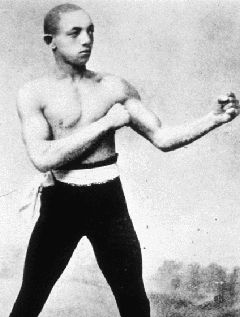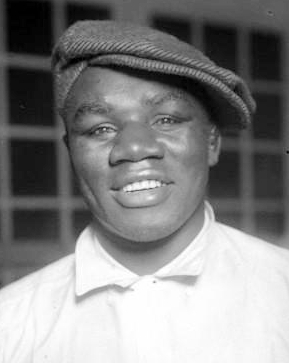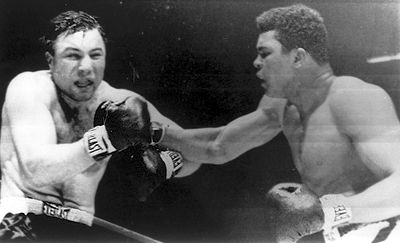Sammy Luftspring, boxer, referee, businessman (born 14 March 1915 in Toronto, ON; died 27 September 2000 in Toronto). Sammy Luftspring was the Ontario amateur featherweight champion in 1933 and the Canadian amateur welterweight champion in 1938. A proud Jew, Luftspring wore the Star of David on his trunks and was subjected to anti-Semitism throughout his life. He fought Nazi youth in the Christie Pits Riot and is perhaps best remembered for boycotting the 1936 Olympic Summer Games in Berlin. He also landed in the Guinness Book of World Records for officiating some 2,000 fights. He has been inducted into Canada’s Sports Hall of Fame and the Ontario Sports Hall of Fame.
Family and Early Life
Luftspring’s father, Yossel (“Joseph”), and mother, Bella, were of Jewish descent. They immigrated to Canada from Poland. Sammy’s parents, grandmother and aunt were all bootleggers. (See Prohibition in Canada.) According to the Ontario Jewish Archives, Sammy, along with his eight siblings, lived in poverty, even though his parents were considered working class.
Luftspring’s family initially lived in the Toronto neighbourhood called The Ward. Bullied at school due to the fact that he was shy and undersized, Luftspring joined the boxing club at the Young Men’s Hebrew Association to better protect himself. The boxing techniques he learned helped him fight back against bullies in the playground. He was soon known for his “lightning-fast reflexes,” according to Kevin Plummer of the Torontoist. Still, he did not receive much of an education growing up, even though his family was able to move from The Ward to Kensington Market due to their bootlegging success. While living in Kensington Market, Luftspring remembers acquainting with people from a wide variety of backgrounds. There were the “respectable citizens,” but also those who were criminals, gamblers, bookies and fellow bootleggers.
Early Boxing Career
The Young Men’s Hebrew Association where Luftspring first started to train was located on Brunswick Avenue. As a teenager in 1932, he boxed for the Toronto Brunswick Avenue Talmud Torah school. It was common for him to have the Star of David on his boxing trunks. From 1932–36, Luftspring had a phenomenal amateur record of 100 wins and 5 losses. In 1933, at age 17, he recorded his first significant accomplishment when he won the Ontario featherweight championship.
The same year he was a provincial champion, Luftspring participated in the Christie Pits Riot in Toronto. It broke out on 16 August 1933 after a group of Nazi youth from a local “Swastika Club” displayed a swastika flag at a Jewish team’s baseball game at Christie Pits Park. The riot involved more than 10,000 people and is considered one of Canada’s worst outbreaks of ethnic violence. The riot resulted in numerous injuries, but no deaths. Afterwards, Toronto mayor William Stewart prohibited future displays of the swastika.

1936 Olympic Summer Games
It was Luftspring’s dream to participate at the Olympic Summer Games. However, the fact that the 1936 Olympics were to take place in Berlin, Germany, complicated matters. As of 1933, Jewish people in Germany were not allowed to participate in sports under the Nazi regime and were banned from public places.
In June 1936, Luftspring and bantamweight boxer Norman “Baby” Yack, a fellow Jew from Toronto, announced their intention to compete at the Canadian Olympic boxing trials in Montreal. However, Luftspring was encouraged by his parents and friends not to make the trip to Berlin. Luftspring and Yack withdrew from the Olympic trials in protest. On 7 July 1936, 25 days before the Olympics were set to begin, Luftspring and Yack wrote a letter that was published in the Globe. It read, in part:
We know that we, as Canadian boys, would be probably safe, and perhaps well received in Germany. But can we forget the way the German government is treating the Jewish boys in Germany? No athlete or sportsman would think of engaging in a sporting contest with a bully who would ill-treat even a dumb animal. The German government is treating our brothers and sisters worse than dogs…. We would have been very low to hurt the feelings of our fellow Jews by going to a land that would exterminate them if it could.
Nonetheless, Luftspring and Yack encouraged their fellow Canadian Olympians to continue their Olympic dream and proceed to Berlin. They wished their teammates the best of luck.

The People’s Olympics
In July 1936, an alternate Olympic Games called the People’s Olympics was to take place in Barcelona, Spain. Approximately 8,000 athletes were to participate. Luftspring and Yack were among the Canadian athletes set to take part. However, the event never happened. Three days before it was set to start, there was a military uprising in Spain, and the Spanish Civil War began.
Professional Boxing Results
Luftspring’s record as a professional boxer is marred by inconsistent reports. Some sources say he went 49–7, while others claim his career record was 37–5 or 32–8. He won at least three fights by knockout and was never knocked out himself. His most memorable professional victory came on 3 October 1938 at the Mutual Street Arena in Toronto. In the 13th round, Luftspring knocked out Frankie Genovese to become the Canadian welterweight boxing championship. It was a dominant performance by Luftspring, who knocked Genovese down five times. That same year, Luftspring was ranked the No. 7 welterweight boxer in the world. He remained the Canadian welterweight division champion until 1940.
Career-ending Eye Injury
Luftspring fought for the final time on 27 May 1940 in a bout at the New York Coliseum. He was thumbed in the eye by his opponent, Steve Belloise. It was determined that the eye injury was inoperable because Luftspring’s retina had become detached. He lost his vision in that eye and never fought again.
Post-Boxing Career
After his successful career as a boxer, Luftspring initially experienced challenges trying to establish himself in life. He became a cab driver to support his family. He had married his wife, Elsie, in 1938, at the McCaul Street Synagogue. The couple had two children: a son, Brian, and a daughter, Orian.
In 1941, Luftspring returned to boxing as a referee. He went on to officiate some 2,000 fights at the professional and amateur levels, an accomplishment that landed him in the Guinness Book of World Records. The most famous fight he officiated was a world heavyweight championship bout between George Chuvalo and American Ernie Terrell at Maple Leaf Gardens on 1 November 1965. He is also remembered for officiating a 1970 bout between Clyde Gray and Humberto Trottman in which Trottman attacked Luftspring and Luftspring punched back. In the 1950s and 1960s, Luftspring also owned the Toronto night club the Mercury Club. His autobiography, Call Me Sammy, was published in 1975.
Honours
Luftspring was inducted into Canada’s Sports Hall of Fame in 1985 and the Ontario Sports Hall of Fame in 1996. He passed away at the age of 85 on 27 September 2000.

 Share on Facebook
Share on Facebook Share on X
Share on X Share by Email
Share by Email Share on Google Classroom
Share on Google Classroom







